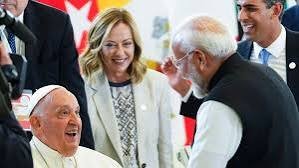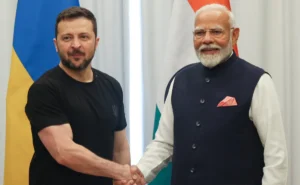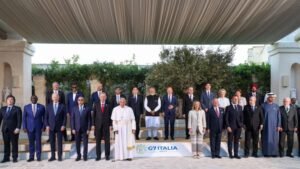At the G7 Outreach Summit in Italy’s Apulia region, a warm moment was captured as Prime Minister Narendra Modi embraced Pope Francis, showcasing a gesture of goodwill and mutual respect. This historic event, held at the luxurious Borgo Egnazia resort, saw the Pope becoming the first pontiff to address G7 leaders, emphasizing the critical themes of Artificial Intelligence (AI), Energy, Africa, and the Mediterranean.
Pope Francis, escorted by Italian Prime Minister Giorgia Meloni in a wheelchair, greeted several world leaders, including French President Emmanuel Macron and European Parliament chief Ursula von der Leyen. After a meeting with British PM Rishi Sunak, the Pope shared a light-hearted exchange with PM Modi, who admired the 87-year-old pontiff’s dedication to serving people and improving the planet.
“Met Pope Francis on the sidelines of the G7 Summit. I admire his commitment to serve people and make our planet better. Also invited him to visit India,” PM Modi shared on social media.

The Pope’s Address
Addressing the summit, Pope Francis highlighted the dual nature of AI, both its promises and its perils. He emphasized, “The holy scripture says that God gave human beings his spirit in order for them to have wisdom, intelligence, and knowledge in all kinds of tasks. Science and technology are extraordinary products of the potential active in us. The God made it possible for AI to emerge.”
He continued, “This is an extremely powerful tool used in many areas from medicine to labor, culture to communications, and education to politics. Its use will increasingly influence our social interactions, way of life, and future understanding of our identity as human beings.”
The Pope, leveraging his moral authority, called for robust safeguards in AI development. In his annual peace message, he argued for an international treaty to ensure AI’s ethical use, stressing that technology devoid of human values like compassion, mercy, and forgiveness is too dangerous to leave unchecked. “AI must keep foremost concerns about guaranteeing fundamental human rights, promoting peace, and guarding against disinformation, discrimination, and distortion,” he urged.
PM Modi’s Bilateral Meetings

PM Modi’s visit also included significant bilateral meetings. He met with Ukrainian President Volodymyr Zelenskyy, discussing the conflict in Ukraine and India’s support for a peaceful resolution. “Had a very productive meeting with President Volodymyr Zelenskyy. India is eager to further cement bilateral relations with Ukraine,” Modi said, reiterating India’s belief in resolving conflicts through dialogue and diplomacy.

In a meeting with French President Emmanuel Macron, PM Modi focused on enhancing strategic defense cooperation under the ‘Make in India’ initiative. They reviewed the ‘Horizon 2047’ Roadmap and the Indo-Pacific Roadmap, discussing cooperation in defense, nuclear, space, education, climate action, and digital public infrastructure. “The two leaders discussed ways to further strengthen the partnership, including in areas of defence, nuclear, space, education, climate action, digital public infrastructure, critical technologies, connectivity, and culture,” stated Randhir Jaiswal, spokesperson of the Ministry of External Affairs.
During a bilateral meeting with UK Prime Minister Rishi Sunak, the two leaders reaffirmed their commitment to strengthening bilateral relations. Discussions included progress in the Free Trade Agreement negotiations and the implementation of the Roadmap 2030.

PM Modi’s participation at the G7 Summit as an Outreach country highlighted India’s growing influence on the global stage. Invited by Italian President Georgia Meloni, Modi’s address at the summit on AI, Energy, Africa, and the Mediterranean displays India’s proactive role in shaping global policies on these critical issues.











